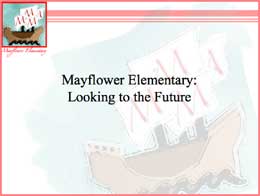How can Mr. Irwin build support for adopting the RTI approach at Mayflower Elementary?
Page 6: Present a Case
 After a principal identifies key individuals, the second step to building support involves his or her presenting a case to the representative group. During his meeting with individuals from the school and community, Mr. Irwin reviews current Mayflower performance data and shares what he has learned about RTI. He uses the following slideshow to present the information he has gathered. Mr. Irwin encourages the group to discuss how the new approach could impact Mayflower Elementary, considering potential benefits as well as concerns. Click here or on the slide below to view Mr. Irwin’s presentation.
After a principal identifies key individuals, the second step to building support involves his or her presenting a case to the representative group. During his meeting with individuals from the school and community, Mr. Irwin reviews current Mayflower performance data and shares what he has learned about RTI. He uses the following slideshow to present the information he has gathered. Mr. Irwin encourages the group to discuss how the new approach could impact Mayflower Elementary, considering potential benefits as well as concerns. Click here or on the slide below to view Mr. Irwin’s presentation.
For Your Information
When presenting information on students’ learning outcomes to school personnel, it is often helpful to display the information in charts and graphs. The visual format provides a clear representation of student performance and allows for an easy comparison of data across groups or years.
In response to Mr. Irwin’s presentation, the group decides that RTI has potential benefits for Mayflower Elementary. It also raises several concerns. The benefits and concerns are listed below.
Benefits
- All struggling readers will receive immediate support.
- Students with LD will be identified prior to third or fourth grade.
- Teachers will have greater opportunities to collaborate with colleagues.
- RTI will increase accountability for student learning.
- The school will have data that demonstrate student performance.
Concerns
- Will there be experienced individuals to help guide us through this process?
- How much more paperwork is required for the teachers?
- Will training be provided for the assessment components?
- How much will RTI affect our current classroom practices?
- Will there be more teachers to help us do this?
 Mr. Irwin addresses the questions for which he has details, and the group decides to meet in a week to allow him to gather additional information based on its concerns. Mr. Irwin also schedules several visits to Rosa Parks Elementary School so that group members can see RTI in action. Soon afterward, the group reconvenes and a majority of the members agrees that RTI could have a positive impact on the students at Mayflower Elementary. They are especially excited by the promise that struggling students will be identified early in the school year and that they will receive the support they need. The members of this small group agree to form the planning team, and they establish committees. The committees divide responsibilities to create an action plan and to build support among the remaining staff.
Mr. Irwin addresses the questions for which he has details, and the group decides to meet in a week to allow him to gather additional information based on its concerns. Mr. Irwin also schedules several visits to Rosa Parks Elementary School so that group members can see RTI in action. Soon afterward, the group reconvenes and a majority of the members agrees that RTI could have a positive impact on the students at Mayflower Elementary. They are especially excited by the promise that struggling students will be identified early in the school year and that they will receive the support they need. The members of this small group agree to form the planning team, and they establish committees. The committees divide responsibilities to create an action plan and to build support among the remaining staff.
